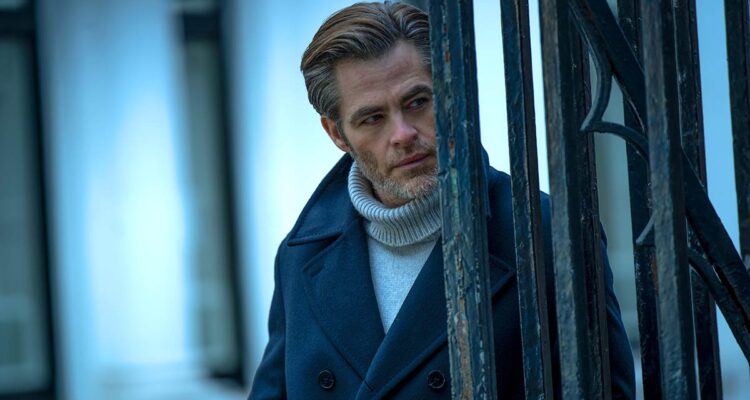The unmitigated boredom and lackluster unoriginality “All the Old Knives” prides itself on shouldn’t shock anyone. After a long line of dreary espionage flicks — “The 355,” “Red Sparrow,” “Wasp Network,” “Beirut” and so forth — Hollywood, outside of the dependable action franchises like “James Bond” and “Mission Impossible,” has been inconsistent at best, producing spy thrillers that possess an enthralling mix of explosions and romance. In this film’s case, the waste of a charismatic lead makes its exhausting shortcomings all the more glaring.
READ MORE: The 100 Most Anticipated Films Of 2022
Emanating from a fictional 2012 hijacking by Chechen extremists of a Turkish Alliance flight in Vienna, the concept is ripped from the 1970s, from the romance-espionage stuff you’d find in a John le Carré novel. But the script, written by Olen Steinhauer from his same-titled novel, never engages in conversation with any contemporary dialogue centering global terrorism or American imperialism. When Tomas Alfredson adapted le Carré’s “Tinker Tailor Soldier Spy,” for instance, he took care to pull out themes of misinformation and the futility of engaging in spycraft. “All the Old Knives” desperately believes it’s targeting similar thematic aims, but the ingenuity required to accomplish such ideals feels absent here.
The film begins with the fallout from the hijacking. The camera pans around the sterile conference room of the CIA: Some stand in shock, others move through the space frantically, one is crying. Flash forward to eight years later, station chief Vick Wallinger (Laurence Fishburne) dispatches one of his top agents, the weathered and weary Henry Pelham (Chris Pine), the last of the spies at the agency who worked the disaster, to investigate. See, a batch of phone records, new evidence to the agency, lists a suspicious phone call from inside the station on the day of the hijacking to a number in Tehran. Was there a mole? Pelham visits two old co-workers, Bill Compton (Jonathan Pryce), now living in London, and his old flame, Celia Harrison (Thandiwe Newton) taking up residence with her husband and young daughter in Los Angeles.
The bulk of the film, directed by Janus Metz (“Borg vs. McEnroe”), takes place in the sun-soaked confines of a wine bar. Henry and Celia share a table as new rounds of dishes and refills add commas to their memories. Henry hasn’t seen Celia since the day of the hijacking, when she ran away from his apartment. This meeting, ostensibly to discover if she’s the mole, is really to uncover why she left. Like any spy, Henry is highly observant. The bar is noticeably empty, save for a suspicious man at the bar and jumpy waitress. Is this a set-up or mere paranoia? Metz teases the possibility as a dramatic backdrop to the dialogue-heavy recollections shared by Henry and Celia.
“All the Old Knives” gestures toward outlining how espionage destroys everyone involved, especially those spied upon. In this case, Muslims. But the film actively participates in the same sins it’s critiquing. First by using the tired trope of Muslim hijackers, men screaming at the top of their lungs, incoherently, while waving a gun. Both Henry and Celia’s local Muslim sources are treated as window dressing, only useful to both the characters and the script for the morsels of information they’re allowed to give. The script tries to circumvent these shortcomings by introducing how Henry gave up one of his first trusted sources, a baker (Orli Shuka) with a wife and a daughter, to the Russians, in return for information. Now that baker is radicalized. The subplot is meant to humanize the character, demonstrating how good people can turn to destructive ends when pushed. But Metz is so concerned with how spycraft has affected Henry, it never really gets beyond a superficial understanding of his plight.
Likewise, the supporting players barely register above scenery chewing. Henry’s interrogation of Bill in a London pub, a gray and grim rendering of London bordering on parody, is pure exposition, devoid of any dramatic heft. Pryce, for his part, makes a spirited effort to imbue these scenes with some depth. But no actor is capable of elevating this dire material. Fishburne barely plays a factor (he might have five minutes worth of screen time). And the other characters, Henry’s fellow spies, one played by Ahd Kamel, aren’t at all interesting.
Instead, the entire movie rests upon the shoulders of Pine and Newton. A grave mistake because while Pine fits the part of spy (he did portray Jack Ryan after all), carving a lean figure in a hugging white turtle neck and black peacoat, the naturalistic Newton isn’t at all believable as a CIA agent. The script further tries to sell a burning romance between Henry and Celia, but the two actors have zero chemistry. A cringe sex scene between them confuses showing skin with fashioning sensuality. And their uninspiring passion lowers the room temperature below lukewarm. These interpersonal obstacles slow the proceedings to a crawl, reducing their back and forth in the wine bar to long-winded monologues that take far too long to reveal anything pertinent.
Though Pine and Newton can’t wake “All the Old Knives” from its snooze, the blame doesn’t lie solely with them. Every seam shows, here. The wine bar scenes move from full shots, to medium, to close-up, to extreme close-ups. The extreme close-ups, resting on their eyes, in particular, are so unflattering to both stars, they cut them at the knees. What hope can Pine and Newton have if you can barely see them emote? Outside of a sterling one-shot through the CIA office, many of the compositions are flatly lit. And the direction by Metz, often placing his actors in the worst position to succeed, offers no additional draw. It’s all pastiche; all surfaces with nothing below. And it leaves one cold. [C-]

